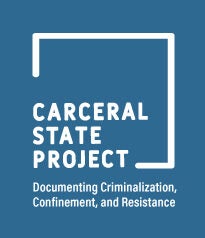
This section presents reports and other storytelling products from the Confronting Conditions of Confinement research team and other CSP teams whose work intersects with these topics. This section documents the physical and social conditions, the social, emotional, and psychological impacts, and the human costs of being confined in a Michigan correctional facility, both historically and today. The publications under the Confronting Conditions of Confinement theme also excavate a usable past and imagine a more just future through documentation of the creative expression of people incarcerated in Michigan, collection of oral histories and letters from from people on the inside and those who have returned, and research into the many ways that individuals, communities, and organizations have resisted the dehumanization and violence of the carceral state. This section focuses on prisons and jails in the state of Michigan; the research area of immigrant detention, while closely linked, can be found in the Immigration and the Carceral State section.
Documenting Incarceration and Resistance in Michigan Prisons and Jails

“Confinement in Macomb County” Michigan’s Macomb County Jail, just north of Detroit, opened in 1954. It was built to hold approximately 100 prisoners. Today, it regularly holds over 1,200 people and years of constant expansion have resulted in buildings covering over 300,000 square feet. This past January, it was approved for yet another expansion, which will cost over $228 million dollars. In the era of American Mass Incarceration, the Macomb County Jail accounts for a small portion of the entire U.S. prisoner population of approximately two million people. But the jail’s rapid growth, its racially disproportionate population, and inhumane conditions of confinement are representative of mass incarceration throughout the country.
In this report, a team of researchers from the CSP investigates the growth of the Macomb County Jail, with moving first hand testimony from researcher Kel Keller, who spent over a year held in the Macomb County Jail.

“The Prisoners’ Labor Union in Jackson, Michigan”, written by CSP researcher Dominic Coschino, is the story of prison labor in America, as seen in local perspective. Over 1.2 million people are incarcerated in the U.S. Nearly all of these people must work for little to no pay or face additional criminal punishment. Incarcerated people have always resisted this labor exploitation in a number of ways throughout history. On April 30, 1972, prisoners at Michigan’s Jackson State Prison took the radical action of starting a Prisoners’ Labor Union. This multimedia investigative report traces the history of prison labor in the United States and the centrality of prison labor to keeping prisons operating. It then tells the story of the origins of the Prisoners’ Labor Union at Jackson, its rapid rise and swell of support across Michigan, and finally the repression union leaders faced from prison administrators and the eventual legal defeat of the union. Though prisoners at Jackson and nationwide have never secured the right to unionize, prisoners still form unions and organize strikes. The story of the Prisoners’ Labor Union serves as a testament to the ingenuity and courage of incarcerated people to protest their confinement and demand better conditions.
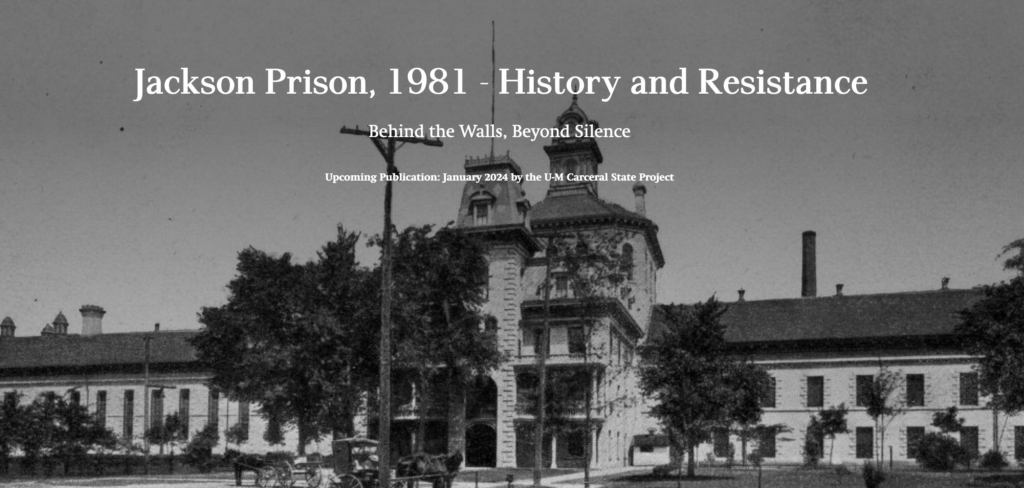
“Jackson Prison, 1981” is the story of incarceration and resistance at Michigan’s Jackson Prison. On May 22, 1981, guards at Michigan State Prison (also referred to as Jackson Prison) staged a ‘lockdown and weapons search’ of incarcerated individuals, despite warnings from prison authorities not to do so. During this lockdown, incarcerated individuals also staged an uprising against this unfair search and treatment. To this day, questions remain about the actual cause of the Jackson Prison uprising – was it the result of tensions boiling over after years of a growing carceral state?
Through this report, we hope to shine more light on the political atmosphere of Michigan leading to the uprising, the prison’s history, the grievances of those incarcerated, the debate over the causes, and the aftermath for all involved.

“Eyes on the Inside“ presents a series of eye opening interviews with Michigan prisoners. CSP researcher and returning citizen Kel Keller was incarcerated in Michigan during the Covid-19 outbreak. While in prison, Kel spoke with other men who wanted to share their stories about the Kinross uprising, Covid-19, and other experiences. As well, Kel shares some of his own writing about dealing with the COVID crisis firsthand as well as narrates his account of important discussions he had while inside with friends who had experienced the uprising at Kinross directly and personally.

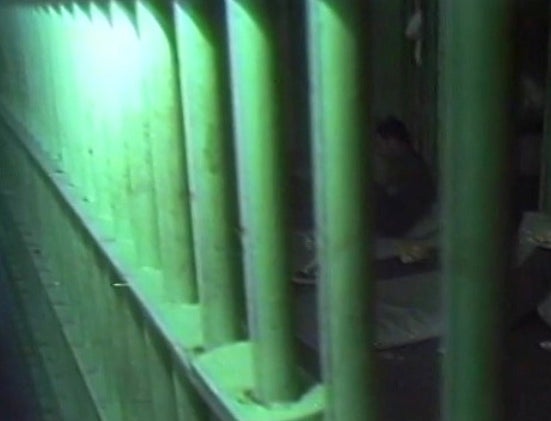
Voices from Inside
Lived experiences of people currently and formerly incarcerated in Michigan
Voices From Inside is a groundbreaking exhibition that showcases the lived experiences of people currently and formerly incarcerated in Michigan. The project’s goals are to contextualize experiences of incarceration within an individual’s whole, human life, and to offer a platform for incarcerated people to share their unfiltered experience with the public. In oral history interviews, formerly incarcerated people spoke about their childhoods, their first experiences of the criminal punishment system, how they coped in prison, and how they have rebuilt their lives since their release. Currently incarcerated individuals sent in written testimonials covering the same subjects.
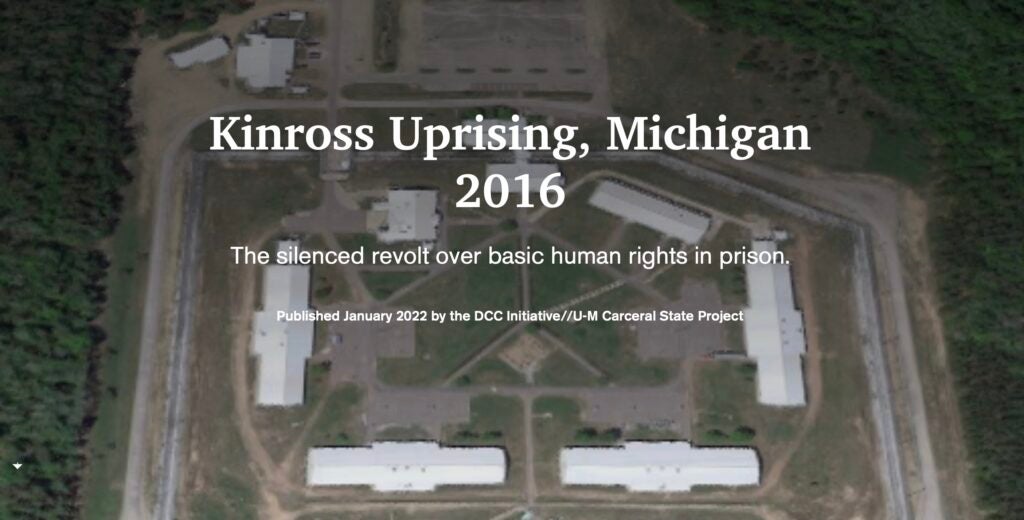
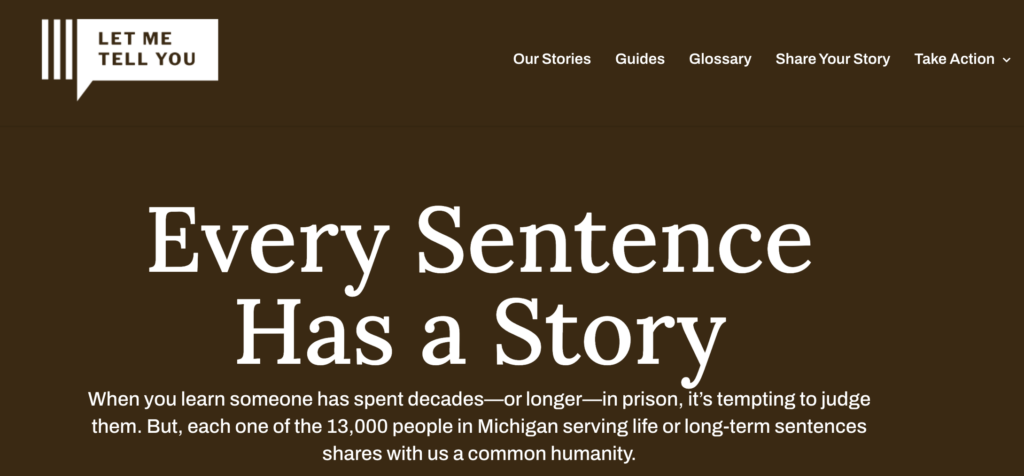
Let Me Tell You is a storytelling initiative working across Michigan’s 31 prison facilities to document the experience of life and long-term prison sentences. Michigan’s prisoners serve longer sentences, on average, than all other prisoners across the nation. There are currently 13,000 people serving life and long-term sentences in Michigan prisons. Each one of these people shares with us a common humanity. They are living proof that extreme punishment doesn’t work. People serving life and long-term prison sentences are proven to age out of crime, but they’re trapped in a merciless system that doesn’t recognize growth. Meanwhile their families and communities suffer, robbed of vital connections and resources.
The Let Me Tell You project is an attempt to showcase this humanity, by collecting and archiving first person stories about the experience and impact of long imprisonment in Michigan.
Covid-19 In Prison

“I Don’t Want To Die in Prison”: Prison Conditions, Decarceration, and Mutual Aid in the Age of COVID-19 is a white paper by the Confronting Conditions of Confinement team in partnership with the Michigan Criminal Justice Program of the American Friends Service Committee. The report presents an evidence-based case for decarceration as the only humane and meaningful response to the COVID-19 pandemic in prisons, based on extensive documentation of current conditions by people incarcerated in the state of Michigan. Co-written by Nora Krinitsky, Pete Martel, and Megan Wilson. Published July 2020.

Incarceration in the Age of COVID-19. Michigan Department of Corrections facilities closed to visitation in March 2020 in an attempt to stem the spread of COVID-19 in prison. Since then, DCC researchers have corresponded with incarcerated people to learn more about their conditions of confinement during COVID-19. This series of rapid response reports features the voices of incarcerated people who have shared their experiences and provided their own recommendations about what actions must be taken. The first two reports are below. View all reports in the series here.
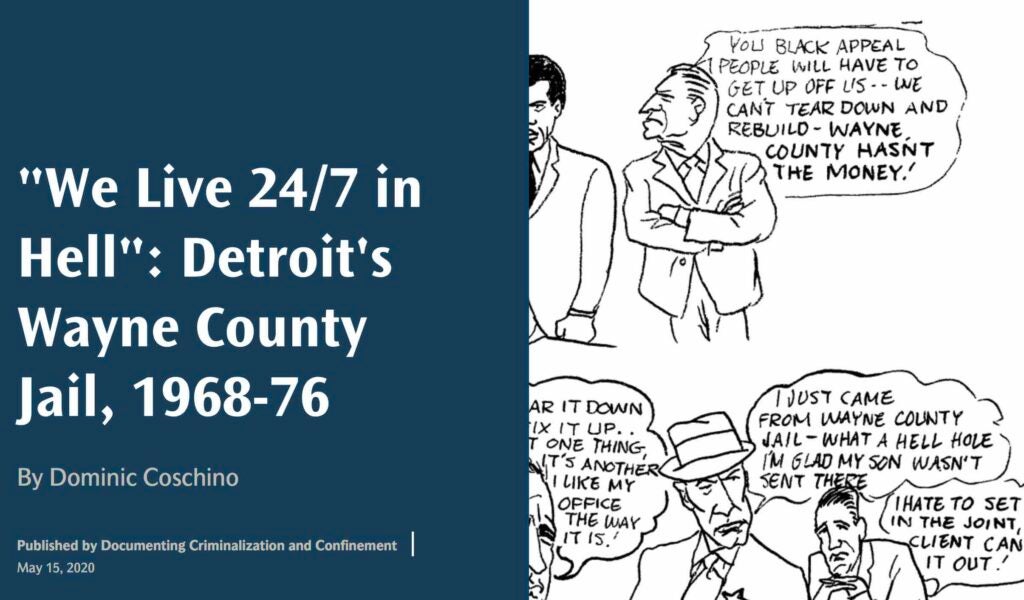
“We Live 24/7 in Hell” is a multimedia report that chronicles the inhumane conditions and racist oppression in Detroit’s Wayne County Jail from 1968-1976. Then as now, a large majority of those incarcerated were poor African Americans in pretrial detention and convicted of no crime. The report reproduces dozens of documents about the experiences of incarcerated people, including affidavits and testimony from the lawsuit filed by a radical coalition. Researched and created by Dominic Coschino for the DCC’s “Detroit as a Carceral Space” initiative. Published May 2020.
Life Without Parole

Living on LOP: What We Learned in Prison is a video series, initiated by formerly incarcerated artists Patrick Bates and Cozine Welch, that features the stories of formerly incarcerated people who share the lessons they have learned in prison that can now help us all adjust to life during the COVID-19 pandemic. The 12-part weekly series premiered June 12, 2020, and elevates the voices of those who have been most impacted by purposeful systemic oppression in our society. Created by the Documenting Prison Education and Arts team. View all episodes here.
Profiles and Publications

